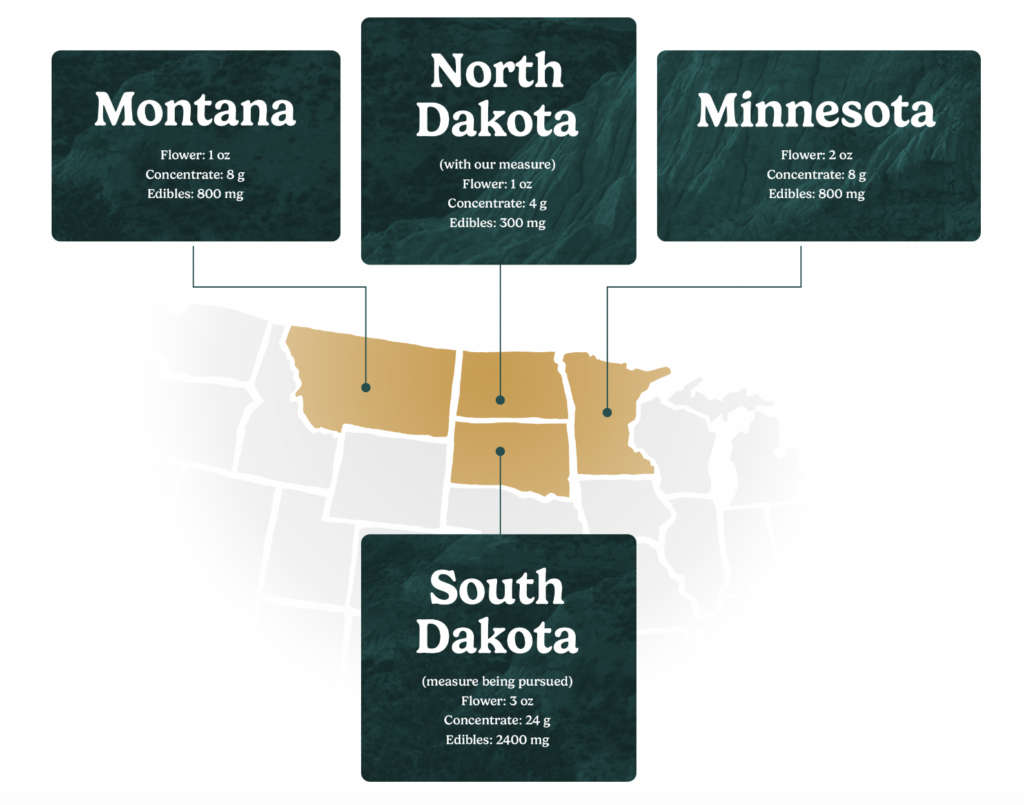North Dakota Activists File Marijuana Legalization Initiative For November Ballot
North Dakota activists have filed an initiative to put marijuana legalization on the state’s 2024 ballot, pitching their reform proposal as a “conservative” alternative to the cannabis laws in surrounding states such as Minnesota and Montana.
The committee New Economic Frontier announced on Tuesday that it submitted its petition with the state, teeing up a potential signature drive two years after voters rejected an earlier legalization proposal at the ballot.
Under the new measure, adults 21 and older would be able to possess up to one ounce of marijuana flower, four grams of concentrate and 300 milligrams of edibles that they could buy from a limited number of licensed dispensaries. Adults could also grow up to three plants for personal use, with a six-plant cap per household.
The state Department of Health and Human Services or another agency designated by the legislature would be responsible for regulating the program. Regulators would need to establish rules to implement the law by October 1, 2025.
In order to make the November ballot, advocates will need to submit at least 15,582 valid signatures from eligible North Dakota voters by July 8.
Mark Friese, a Fargo-based criminal defense attorney who’s part of the sponsoring committee, said in a press release that he’s personally “seen how criminalizing cannabis drains resources from law enforcement and clogs our courts.”
“This measure is a conservative and sensible approach to legalization that I am confident will benefit our state,” Friese, who previously served as treasurer of the earlier 2022 cannabis legalization campaign, said.
The proposal would limit regulators to approving licenses for up to seven cannabis manufacturers and 18 dispensaries. There are also provisions meant to avoid creating intrastate monopolies, such as limiting individuals to have no more than four dispensaries.
Currently, there are eight medical cannabis dispensaries operating in North Dakota. The initiative requires regulators to develop separate application processes for those businesses to become dual licensees and non-existing companies that wish to become recreational operators.
Casey Neumann, CEO of the medical cannabis companies Pure Dakota and Pure Dakota Health, said the initiative would make it “easier for our neighbors to access cannabis for their medicinal needs, but also will benefit our state as a whole through its taxation.”
“The positive economic impact alone is a key reason why all North Dakotans should vote yes,” he said. “Legalizing cannabis paves the way for a more prosperous future for our state.”
The proposal doesn’t appear to contain criminal justice reform components favored by equity advocates such as expungements or licensing prioritization for people harmed by the drug war. It also doesn’t seem to contain any references to a proposed tax scheme for legal sales.
“Cannabis legalization is coming, and it’s coming fast,” Steve Bakken, a Burleigh County commissioner and former mayor of Bismarck who chairs the sponsoring committee, said.
“We’ve got a choice here—let out-of-state interests call the shots, or take the lead ourselves,” he said. “We’ve carefully crafted this initiative right here in North Dakota, making sure it fits what our community really needs. Let’s embrace this opportunity the North Dakota way, with common sense and local input guiding the way.”
The campaign is emphasizing that the language of its initiative would separate North Dakota’s cannabis program as more “conservative” than those in surrounding states, drawing comparisons to Montana, Minnesota and South Dakota, which hasn’t enacted the reform yet but is working to collect signatures for its own 2024 ballot measure.

Via New Economic Frontier.
In 2021, North Dakota’s House approved a marijuana legalization bill sponsored by Rep. Jason Dockter (R), but it was ultimately defeated in the Senate after advancing through committee.
Following that defeat, some senators devised a new plan to advance the issue by referring it to voters on the 2022 ballot. The resolution moved through a key committee in 2021, but the Senate also blocked it.
There have been repeated attempts by activists to enact legalization in the Peace Garden state over the years.
Advocates with the separate group North Dakota Cannabis Caucus started collecting signatures to qualify a constitutional amendment legalizing cannabis for the 2022 ballot, but they did not gather enough by deadline.
New Approach ND previously led an effort to place a legalization measure on the 2018 ballot that was defeated by voters. They filed another initiative for 2020, but signature gathering complications largely caused by the coronavirus pandemic got in the way.
North Dakota voters approved a medical cannabis ballot measure in 2016.
Meanwhile, last year, North Dakota’s governor signed a bill allowing patients admitted to hospice care to self-certify as medical marijuana patients.
The North Dakota House of Representatives also approved a resolution last year that encourages residents to buy U.S. flags that are made out of hemp and manufactured in the state.
Congressional Lawmakers Approve GOP-Led Marijuana And Psychedelics Bills Focused On Veterans
Photo courtesy of Philip Steffan.




